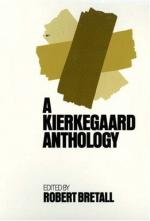|
This section contains 502 words (approx. 2 pages at 400 words per page) |

|
A Kierkegaard Anthology Summary & Study Guide Description
A Kierkegaard Anthology Summary & Study Guide includes comprehensive information and analysis to help you understand the book. This study guide contains the following sections:
This detailed literature summary also contains Topics for Discussion and a Free Quiz on A Kierkegaard Anthology by Robert W. Bretall.
Soren Aabye Kirekegaard (1813 - 1855) was one of the most important philosophers of the 19th century. A Danish author, he wrote on a variety of topics including theology, literature, psychology and philosophy. He is first and foremost a committed Christian theologian and philosopher who aimed to resurrect a true and radical conception of the Christian life within a Christian society and who went out of his way to criticize Christian practices and Christian churches of his day. Kierkegaard is widely seen as the founder of existentialism and one of the great critics of the philosopher G.W.F. Hegel and German Romantics. He helped create modernist philosophy and literature and his powerful portrayal of Biblical figures continues to be influential to this day. He is most well-known for his conception of the "leap of faith."
The Kierkegaard Anthology includes these and many other details about Kierkegaard's life, but it also focuses on reproductions of Kierkegaard's personal, philosophical, theological and polemic writings. A vast number of Kierkegaard's writings are presented in this large book and each general compilation from a particular work is introduced by the editor, Robert Bretall, with a variety of historical information on the writing of the piece and the important aspects of the work. He also often cites the most influential Kierkegaard commentators of his day, although it should be recognized that the original version of the book was written in 1946 and Kierkegaard scholarship has moved forward substantially since then.
The book does not intend to be a biography and deliberately does not address any of the controversial details of Kierkegaard's life. Instead, it aims to give the reader selections of Kierkegaard's work, which are arranged chronologically in the order of publication. The passages chosen are fairly self-contained and an effort is made not to take them out of context.
The book contains eighteen excerpts from Kierkegaard's major works which cover too many topics to be generally summarized here. Instead, the anthology aims to reproduce Kierkegaard's body of work as a whole, leading the reader to the various important parts of Kierkegaard's major works. The anthology excerpts his early journals, his famous first book Either/OR, Two Edifying Discourses, Fear and Trembling, Repetition, Philosophical Fragments, Stages on Life's Way, Concluding Unscientific Postscript, The Present Age, Edifying Discourses in Various Spirits, The Works of Love, The Point of View For My Work as an Author, The Sickness unto Death, Training in Christianity, Two Discourses at the Communion on Fridays, Kierkegaard's later Journals, The Attack on "Christendom," and The Unchangeableness of God.
The most prominent themes in these works are understanding the radical nature of the Christian life, how only through faith can Truth be grasped, the nature of sin and original sin, how to be a Christian and practice Christianity and the profound failings of the Christian Church in Denmark and Europe generally, along with a profound emphasis on the individual psyche, soul and experience of meaning and purpose, along with the absurd and meaningless, in life.
Read more from the Study Guide
|
This section contains 502 words (approx. 2 pages at 400 words per page) |

|



